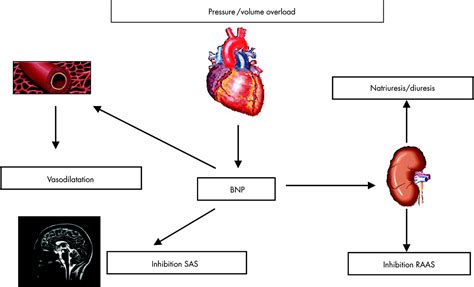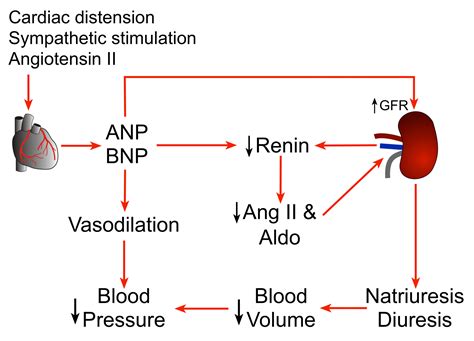Intro
Discover 5 key BNP hormone facts, including its role in heart health, natriuretic peptide functions, and diagnostic uses, revealing the importance of brain natriuretic peptide in cardiovascular disease management and treatment.
The B-type natriuretic peptide (BNP) hormone has gained significant attention in the medical community due to its crucial role in diagnosing and managing heart failure. As a peptide hormone produced by the heart, BNP plays a vital function in regulating blood pressure and fluid balance in the body. In this article, we will delve into the world of BNP hormone, exploring its importance, working mechanisms, and key facts that everyone should know.
The BNP hormone is released by the ventricles in response to excessive stretching, which often occurs in conditions like heart failure. This hormone has become a valuable biomarker for diagnosing and monitoring heart failure, allowing healthcare professionals to make informed decisions about patient care. With the increasing prevalence of heart failure worldwide, understanding the role of BNP hormone is essential for developing effective treatment strategies.
The significance of BNP hormone extends beyond its diagnostic value, as it also provides insights into the underlying mechanisms of heart failure. By studying the BNP hormone, researchers have gained a deeper understanding of the complex interactions between the heart, kidneys, and blood vessels. This knowledge has led to the development of new therapies and treatments aimed at improving outcomes for patients with heart failure. As we continue to explore the world of BNP hormone, we will discuss the key facts that highlight its importance and relevance in modern medicine.
Introduction to BNP Hormone

Production and Secretion of BNP Hormone
The production and secretion of BNP hormone are tightly regulated by the heart, with the ventricles being the primary site of synthesis. The hormone is released into the bloodstream, where it can be measured using laboratory tests. The levels of BNP hormone in the blood can provide valuable information about the presence and severity of heart failure, allowing healthcare professionals to make informed decisions about patient care.Functions of BNP Hormone

Clinical Significance of BNP Hormone
The clinical significance of BNP hormone lies in its ability to diagnose and monitor heart failure. Elevated levels of BNP hormone in the blood can indicate the presence of heart failure, while decreased levels can suggest an improvement in cardiac function. The hormone can also be used to monitor the effectiveness of treatments and to predict patient outcomes.BNP Hormone and Heart Failure

The use of BNP hormone in diagnosing heart failure has several advantages, including:
- High sensitivity and specificity: BNP hormone levels can accurately diagnose heart failure, even in patients with mild symptoms.
- Non-invasive: Measuring BNP hormone levels is a non-invasive procedure that can be performed using a simple blood test.
- Rapid results: BNP hormone levels can be measured quickly, allowing healthcare professionals to make informed decisions about patient care.
Treatment Strategies for Heart Failure
The treatment of heart failure typically involves a combination of lifestyle modifications, medications, and devices. Lifestyle modifications may include dietary changes, exercise, and stress reduction, while medications may include diuretics, beta-blockers, and ACE inhibitors. Devices such as pacemakers and implantable cardioverter-defibrillators may also be used to manage heart failure.BNP Hormone and Other Medical Conditions

Future Directions for BNP Hormone Research
The future of BNP hormone research is promising, with several potential applications in the diagnosis and treatment of heart failure. Some potential areas of research include: * Developing new biomarkers: Researchers are exploring the development of new biomarkers that can diagnose heart failure more accurately and earlier than BNP hormone. * Improving treatment strategies: The use of BNP hormone to monitor treatment effectiveness and predict patient outcomes may lead to the development of more personalized treatment strategies. * Exploring new therapeutic targets: The BNP hormone pathway may provide new therapeutic targets for the treatment of heart failure, such as inhibitors of the renin-angiotensin-aldosterone system.Conclusion and Final Thoughts

We invite you to share your thoughts and questions about BNP hormone in the comments section below. If you found this article informative, please consider sharing it with others who may benefit from this knowledge. Together, we can work towards a better understanding of the BNP hormone and its role in promoting cardiovascular health.
What is the normal range for BNP hormone levels?
+The normal range for BNP hormone levels is typically less than 100 pg/mL, although this can vary depending on the laboratory and the specific test used.
Can BNP hormone levels be elevated in conditions other than heart failure?
+Yes, BNP hormone levels can be elevated in conditions such as coronary artery disease, cardiac arrhythmias, and pulmonary embolism.
How is BNP hormone used to diagnose heart failure?
+BNP hormone levels are used to diagnose heart failure by measuring the levels of the hormone in the blood. Elevated levels can indicate the presence of heart failure, while decreased levels can suggest an improvement in cardiac function.
